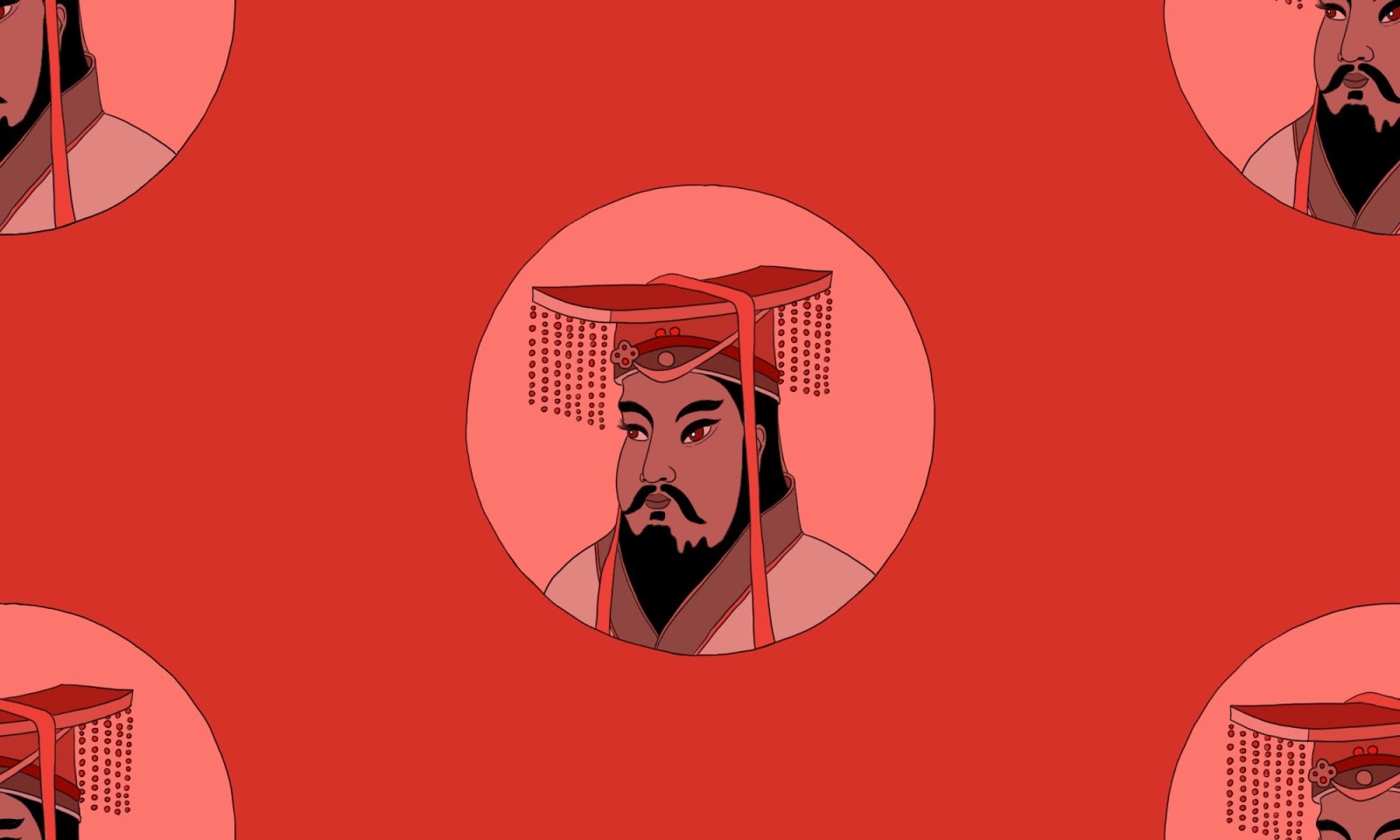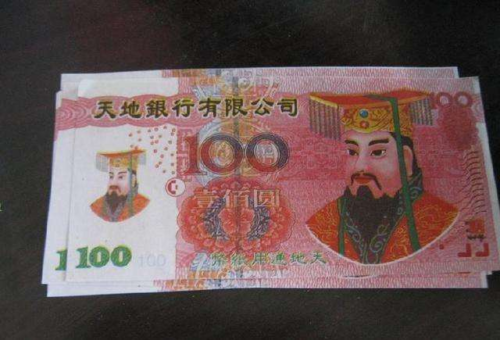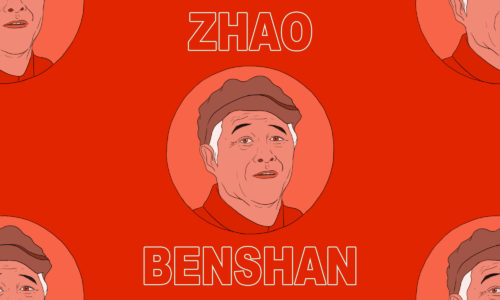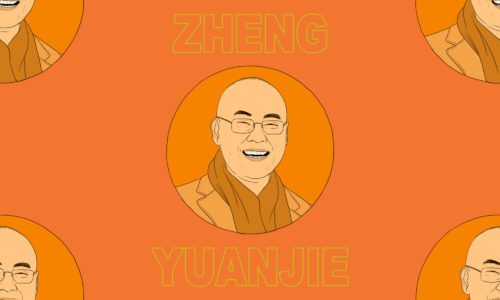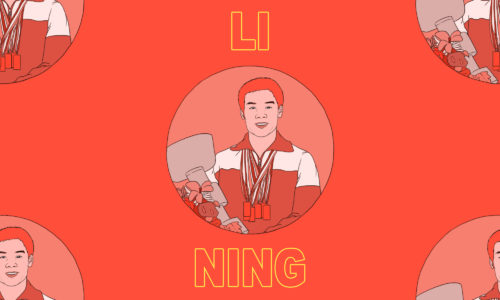He sits serenely, flanked by two fan-bearers, clad in a traditional mortar-board “mian” hat, its 12 cords credentials of imperial status. Hands protrude from cascading golden robes, clasping a jade tablet to his chest. His beard is as long as his gaze. He’s meant to impress: while an emperor ruled China, heaven was the realm of the Jade Emperor.
Who is the Jade Emperor?
The Jade Emperor is the head honcho of the divine Daoist pantheon. Perhaps he’s the Dao given human form, or the mysterious “Lord of Heaven” (天公 tiān gōng), a vague guiding entity awarding dynasties with the “Mandate of Heaven.”
He holds court from his majestic “Purple Palace” in the sky (from which Beijing’s Forbidden City — 紫禁城 zǐ jìn chéng, literally “Purple Forbidden City” — gets its name). He’s the head of a bureaucratic system just like his earthly counterpart, with 36 ministers all reporting to him, in turn commanding an army of celestial clerks. The lesser gods send him annual reports of their dealings, and the Kitchen God brings records of the deeds of every household at New Year — virtue rewarded, sins punished.
But the higher someone is, the funnier to see them fall. The Jade Emperor has been plagued by mockery, his history a strange combination of majesty and comedy, pathos and bathos, inscrutable as the bureaucracy he heads and just as inept.
As the Ruler of Heaven, his face adorns so-called “Hell Money” (冥币 míng bì), fake cash burned for ancestors at Qingming Festival (a.k.a., Tomb-Sweeping Day). But the image is based on an actor who is typecast in China for playing the Jade Emperor, appearing as him in numerous TV shows since 2000. The actor in question was upset to see his face hubristically adorning the currency of the gods:
Depending on who you believe, the Jade Emperor — a.k.a., “The True Lord of Heaven, Earth and Mankind, in all areas and of the Mystical Spirits” — is either a Christ-like being of destiny or a jumped-up office worker.
A Fujianese legend says his parents, the King of Pure Virtue and Queen of Gilt Moonlight, yearned for a child. One night the Queen dreamt of an august god descending from the sky, babe in arms. “This is no ordinary child,” the god said. “One day he will attain the highest level of Dao. You must take good care of him.” The Queen became pregnant soon afterwards.
But a Ming Dynasty text tells it very differently: When the Prime Minister of Zhou was filling roles in the heavenly host around 1180 B.C., he left the post of Supreme Deity vacant. Secretly he meant it for himself. When offered the post at a meeting, he behaved with great dignity, stolidly asking them to “wait a second” (“Deng Lai”) while he pretended to mull over this great responsibility. But a minor courtier named Zhang Deng Lai, thinking he heard his name, stepped up and thanked him for the honor of being the Jade Emperor. Quietly gnashing his teeth, the prime minister had no choice but to appoint the man.
The Ming didn’t treat the Jade Emperor with much reverence. Many in China know him through adaptations of the Chinese classic Journey to the West, written under the Ming. The Jade Emperor (“of the Azure Vault of Heaven”) is dutiful and works hard in his “Golden-Gated Cloud Palace” surrounded by his ministers in the “Hall of Miraculous Mist.” Despite the grand set-up, he’s flighty, and a blinkered, impetuous decision-maker, no match for the sheer power of the almighty Buddha, who holds the universe in the palm of his hand. The Jade Emperor is far short of omniscient, giving the mischievous Sūn Wùkōng 孙悟空 (the “Monkey King”) the job of guarding the heavenly peach orchard to keep him out of trouble. But in Chinese culture, asking a monkey to guard peaches is about as safe as asking a bear to guard honey. The peaches are devoured.
But legend describes the Jade Emperor as brimming with wisdom and grace, a prince of the heavens who abdicated his throne and headed to the mountains. There he meditated for eons (103,200 kalpa, to be exact — one “kalpa” being the time it takes for a universe to begin and end) to save his people from the endless cycle of death and reincarnation — parallels with the story of the Buddha abound. Eventually he gains enough virtue to be worthy of sitting upon the throne of Heaven.
Like the Chinese emperor, even the Jade Emperor has someone to answer to — he’s not the highest in heaven. That honor goes to the “Three Pure Ones,” beings who were created in chaos and created the world in turn.
No one’s sure when his cult of worship began, but it was definitely grassroots, incorporated by Daoists into their divine hierarchy (perhaps as a response to the popularity of the Buddha ). He was enthroned by Song Dynasty Emperor Zhēnzōng 真宗, who in 1013 ordered his court to worship the deity, stating this was the god they had been praying to all these years in the sacrosanct Temple of Heaven in Beijing.
A prayer to him was heavy with significance. The earthly emperor would kowtow for rain at the top of Coal Hill (immediately north of the Forbidden City) during long droughts, or give thanks on the summit of Tai Shan on the very rare occasion when China was prosperous within, at peace without, and blessed with a ruler of exceptional charisma or achievement. He was a figure so grand that even if you passed a sign bearing his name, you had to give 27 kowtows.
His family has made a splash in Chinese legend, too. There’s his daughter, the weaver girl (Zhī Nǚ 织女), who fell in love with a woodcutter, her disapproving father separating them at either end of the Milky Way except for one night each year — now known as the Qixi Festival.
A Daoist shyly asks his favor as a last resort, when all lesser gods have been exhausted, even then only for something like fortune telling. But offerings can be freely given on his birthday, which falls on the 9th day of the first lunar month, during Chinese New Year. It’s celebrated across Southeast Asia. Incense is burned, and food offered — but red pork must be included if you want to avoid divine displeasure.
Either as a transcendent cosmic judge or mirror image of flawed human rulers, the Jade Emperor still rules his Azure Vault, long outliving those who created or mocked him.
Chinese Lives is a weekly series.
